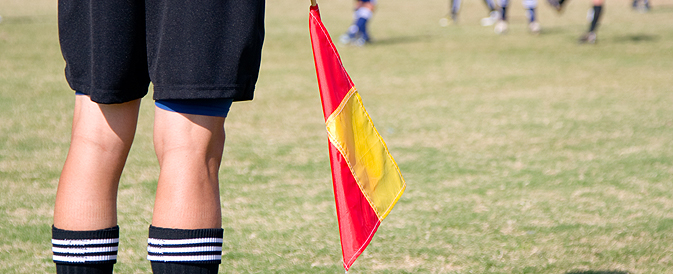The Fourth Official

The aim of this page is to provide a comprehensive understanding of the Fourth Official's role. At the bottom of this page, you will find an extensive listing of what a Fourth Officials responsibilities are - this is dependant on which duties the match Referee wishes to assign to the Fourth Official. Nevertheless, the listing demonstrates the important (often-underrated) role that the Fourth Official often takes.
| The higher the standard of football, the more responsibilities the Fourth Official will have. For example: - the extraneous duties expected at the top level (such as in an English Premier League match) include involvement with crowd security aspects in conjunction with the security staff, media relations, and onerous administrative
procedures such as the procedural paperwork involved with substitutions etc. The Fourth Official comes under the authority of the Referee at all times, and it is the Referee's duty to clarify what he expects his Fourth Official to do. |
The Fourth Official must be made to feel part of the Referee's team, and not as sometimes happens, just a person
to make up the numbers to comply with the Competition Rules.
| History |
The Fourth Official is the newest breed of match official required to control the game of football (soccer), and as such, his role has developed slowly over the past few years.
He has now become an important, essential and active part of the Referee's integrated team. In 1991, the Fourth Official was officially introduced into the Laws of the Game. At that time, the Fourth Official's role was basically to take over from any of the three match officials, should one of them be unable to continue due to an injury. He was also asked to deal with administrative duties, control the replacement footballs, and to check the substitutes' equipment. The Fourth Official's role developed further over the ensuing years, giving him more responsibility and credence. In 1995, the Fourth Official was recognized as part of the officiating team.
In 1996 he was given the new responsibility of reporting any occurrences out of the vision of the Referee and the Assistant Referees.
| FIFA Circular No. 585 April 1996 - Amendments to The Laws of the Game: |
The Role of The Fourth Official:
After the match the fourth official will submit a report to the appropriate authorities, on any misconduct
or other incident which has occurred out of the vision of the referee and the assistant referees.
The fourth official must advise the referee and his assistants of any report being made. This enhances
the role of the fourth official as one of the refereeing team and facilitates the use of written evidence
from the fourth official by the appropriate authorities".
1999/2000 allowed the Fourth Official to communicate direct with the Referee, and not necessarily via the Assistant Referee (as had been the case in the past). Informing the Referee of unruly behavior from the Technical Area was also added at this time. This created an official direct relationship between the Fourth Official and the Referee.
Fourth Officials then became an essential part of all top-level games.
In 2000/2001, the Fourth Official was given the new responsibility of informing the Referee if a player or substitute:
-
(a) has been cautioned or sent off based on an incorrect identification:
-
(b) has not been sent off despite having received a second caution: or
-
(c) has committed violent conduct out of the view of the Referee and Assistant Referees.
In 2001/2002 Fourth Officials were allowed to approve a player's return onto the field of play, after the player had
been treated for bleeding or blood on the uniform. Also, to check players in situations where they have been asked by the Referee to leave the field of play due to equipment problems. The evolutionary integration of the Fourth
Official allows the Referee, his Assistant Referees, and the Fourth Official to form a stronger and more efficient team.
In 2002/2003 ‘The Board’ approved that the Additional Instructions for Referees, Assistant Referees and Fourth Officials would now be printed in the Laws of the Game book.
The Referee, along with the rest of his team (Assistant Referees and Fourth Official) is responsible for controlling
the game as efficiently, effectively, and unobtrusively as possible. Each official will have his or her own personality - and this plays an important part in the makeup of the team. Officials will develop their own style of conduct; it is
the Referee's task to lead his team, and to harness the qualities of all his members within a common boundary of standard practices. An individual's style should not interfere with the Referee's control or the flow of the game.
It is important that the team establish clear communication between each other and the players (and the team managers) without causing undue attention to be drawn towards themselves and away from the match itself. After all, the spectators want to see a game of football, and not to witness officials who are trying to attract attention to themselves for one thing or another.
A common accolade often heard describing a match official, is when players or managers comment after the game: " I didn't even notice you in the game". But it must be remembered - that there will always be times when the match officials will need to make themselves know!
